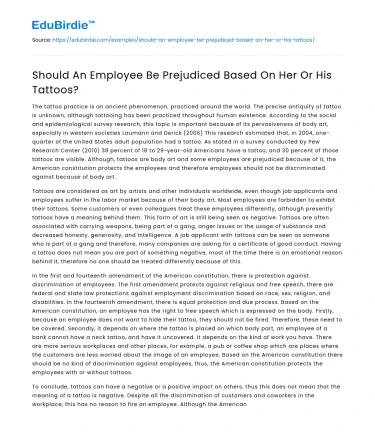The tattoo practice is an ancient phenomenon, practiced around the world. The precise antiquity of tattoo is unknown, although tattooing has been practiced throughout human existence. According to the social and epidemiological survey research, this topic is important because of its pervasiveness of body art, especially in western societies Laumann and Derick (2006) This research estimated that, in 2004, one-quarter of the United States adult population had a tattoo. As stated in a survey conducted by Pew Research Center (2010) 38 percent of 18 to 29-year-old Americans have a tattoo, and 30 percent of those tattoos are visible. Although, tattoos are body art and some employees are prejudiced because of it, the American constitution protects the employees and therefore employees should not be discriminated against because of body art.
Tattoos are considered as art by artists and other individuals worldwide, even though job applicants and employees suffer in the labor market because of their body art. Most employees are forbidden to exhibit their tattoos. Some customers or even colleagues treat these employees differently, although presently tattoos have a meaning behind them. This form of art is still being seen as negative. Tattoos are often associated with carrying weapons, being part of a gang, anger issues or the usage of substance and decreased honesty, generosity, and intelligence. A job applicant with tattoos can be seen as someone who is part of a gang and therefore, many companies are asking for a certificate of good conduct. Having a tattoo does not mean you are part of something negative, most of the time there is an emotional reason behind it, therefore no one should be treated differently because of this.
Save your time!
We can take care of your essay
- Proper editing and formatting
- Free revision, title page, and bibliography
- Flexible prices and money-back guarantee
In the first and fourteenth amendment of the American constitution, there is protection against discrimination of employees. The first amendment protects against religious and free speech, there are federal and state law protections against employment discrimination based on race, sex, religion, and disabilities. In the fourteenth amendment, there is equal protection and due process. Based on the American constitution, an employee has the right to free speech which is expressed on the body. Firstly, because an employee does not want to hide their tattoo, they should not be fired. Therefore, these need to be covered. Secondly, it depends on where the tattoo is placed on which body part, an employee of a bank cannot have a neck tattoo, and have it uncovered. It depends on the kind of work you have. There are more serious workplaces and other places, for example, a pub or coffee shop which are places where the customers are less worried about the image of an employee. Based on the American constitution there should be no kind of discrimination against employees, thus, the American constitution protects the employees with or without tattoos.
To conclude, tattoos can have a negative or a positive impact on others, thus this does not mean that the meaning of a tattoo is negative. Despite all the discrimination of customers and coworkers in the workplace, this has no reason to fire an employee. Although the American constitution protects an employee, it is up to the employee to acknowledge if her or his tattoo must be covered depending on the workplace.






 Stuck on your essay?
Stuck on your essay?

